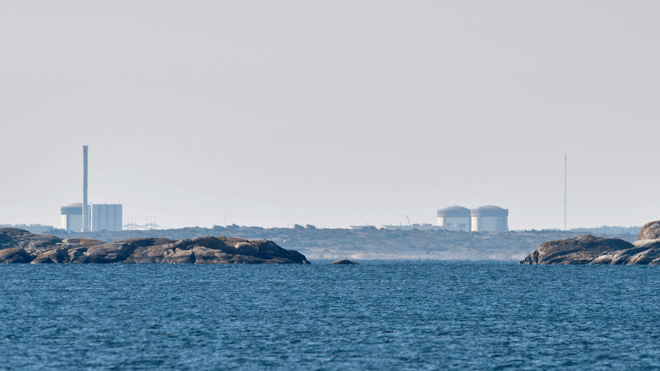
June 21, 2012: The Ringhals atomic power station near Varberg Sweden seen in the distance. Sweden on Thursday raised the security level for the country’s nuclear power plants as police investigated suspected sabotage after explosives were found on a truck at the southwestern atomic power station Ringhals. (AP)
STOCKHOLM – Sweden ramped up security at its three nuclear power plants Thursday after a small amount of explosives without a triggering device was found on a forklift on the grounds of the country's largest atomic power station, authorities said. Police were investigating possible sabotage, but insisted that even if there had been a blast it would not have posed any great danger.
Bomb-sniffing dogs detected the explosives in a routine check Wednesday afternoon by security staff in the power plant's industrial area near its high-security enclosure. Police declined to describe the amount or type of explosive.
Bomb technicians said the material lacked a detonating device, meaning there was no danger of an imminent explosion.
"But even if it would have been equipped with a detonator, a potential blast would have had pretty limited effects -- the truck would have received some damage and perhaps some passers-by would have been injured, but it wouldn't have harmed the plant in any way," police spokesman Tommy Nyman said.
With police providing little information, a terror expert speculated it might have been an attempt to test the security system of the Ringhals power plant with a later attack in mind.
Four nuclear reactors are at Ringhals, 45 miles south of Sweden's second-largest city, Goteborg, which has a population of 550,000 people. The plant is controlled by energy companies Vattenfall and E.ON.
Police said the driver of the forklift truck had been unaware of the explosives and was not suspected of being involved. Nyman said authorities had no suspects and were searching the premises to see if there was more suspicious material.
"An outsider has obviously placed them on the truck," Nyman said. "We're talking to the truck driver and are trying to map out her movements within the (Ringhals) premises throughout the day."
The Swedish Radiation Safety Authority said the explosive material was found "en route from the Ringhals industrial park into a protected area ... and did not enter the facility."
The government declined to comment, saying it was a police matter.
Martina Kruger, head of the Climate and Energy Division at Greenpeace in the Nordic region, said that even though the explosive material lacked a detonator, the incident was extremely serious, showing how vulnerable nuclear plants are for potential attacks.
"It doesn't matter if it was outside the protected area or not, it shouldn't have made itself within the premises at all," she said, accusing both authorities and plant operators of playing the incident down.
Magnus Norell, a terrorism expert at the Swedish Defense Research Agency, said the incident unlikely was a planned attack.
"They never got into the security area. It seems very strange that they tried, knowing that security would be high and also that they used explosives that could be detected by a dog," Norell said. "To me that indicates that it's not very professional."
But he conceded that someone might have been testing the systems.
"It could suggest that someone was testing it to do something serious later on. But it's all pure speculation right now as we have so little information," he said. "It shows the (security) system did work. They picked up on it and nothing happened. That's one good signal."
Security at Swedish nuclear plants has also been criticized. In 2010, Greenpeace activists broke into the Forsmark power plant site by climbing a fence and staging a demonstration there. Twenty-nine Greenpeace activists from Germany, Poland, Britain, France and the Nordic countries were convicted and fined.
Kruger, of Greenpeace, said that it did not look like Thursday's incident was the work of environmental terrorists.
"I find that very hard to believe. Especially in this sort of way," she said. "If environmentalists would have wanted to test the system, they might have used a toy gun or something, but they never would have crossed the line and go on to use something as real as this."
The Swedish nuclear industry has come under fire for the lack of some safety precautions while operating the reactors. Last year, a fire broke out in a Ringhals reactor after the staff had left a vacuum cleaner in the containment building.
Sweden has 10 nuclear reactors at the country's three power plants: Ringhals, Forsmark and Oskarshamn -- providing about half of the country's electricity.
The country has a four-stage security risk scale for the plants, with four representing the highest security alert.
Ringhals was rated at one -- situation "normal" -- but after the incident, the nuclear authority said it raised the security alert by a notch to 2, on a four-grade scale, meaning that security has been increased at all the plants.
In 1980, the Nordic country decided to phase out the use of nuclear energy after Swedes voted for that in a referendum. But two years ago, the center-right government overturned that decision, citing the lack of viable long-term environmentally friendly alternatives, a move that paved the way for old reactors to be replaced by new ones.
Ringhals is Sweden's largest power plant, producing 28 Terawatt-Hours a year, or supplying around 20 percent of the country's electricity.







































